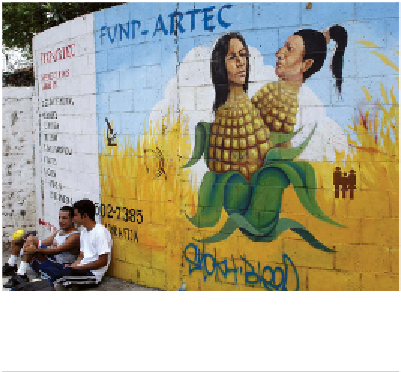Travel Reference
In-Depth Information
rise of cotton wiped out the indigo trade, cof ee became El Salvador's top
cash crop. Cof ee needed to be grown on the hillside. So the people were
displaced again.
Rebellion after rebellion was put down as the land was Christianized. Mak-
ing religion the opiate of the masses, the priests preached, “Don't question author-
ity. Heaven awaits those who suf er quietly.” (Even today, when labor organizers
try to mobilize workers against structural poverty, they hear, “No, our struggles
are God's will.” h ose promoting the left-wing people's party report that their
challenge is to teach poor
Christian peasants that it's
okay to get political and
vote for change.)
El Salvador won its
independence from Spain
in 1821. h e local victors
were not the indigenous
people, but the descen-
dants of those i rst Span-
ish conquistadors. h ey
wanted to continue har-
vesting El Salvador…but
without giving Spain its
cut. Indigenous Salvadorans gained nothing from “independence.”
After the popular uprisings and massacres of 1932, indigenous culture
was outlawed, the left wing was decimated, and a military dictatorship was
established. h ose who spoke the indigenous language were killed. Tradi-
tional dress was prohibited. After 1932, when a white person looked at an
Indian, the Indian's head would drop. To be indigenous was to be subversive.
And today, the word
indígena
still comes with negative connotations: illiter-
ate, ignorant, savage.
In the Bible, God calls for a Jubilee Year (Leviticus 25:10)—every i fty
years, the land is to be redistributed and debts are to be forgiven. Perhaps God
i gured that, given the greedy nature of humankind, it takes about i fty years
for economic injustice to build to a point that drives a society to violence.
Rich Christians can't imagine God was serious. But the sad modern
history of El Salvador shows the wisdom in the Biblical Jubilee year. h ere's
a pattern that I think of as Jubilee massacres: a dramatic spike in violence
While political murals are dangerous these days, indig-
enous Salvadorans—who call themselves “people of
corn”—celebrate their ethnicity instead.















































































